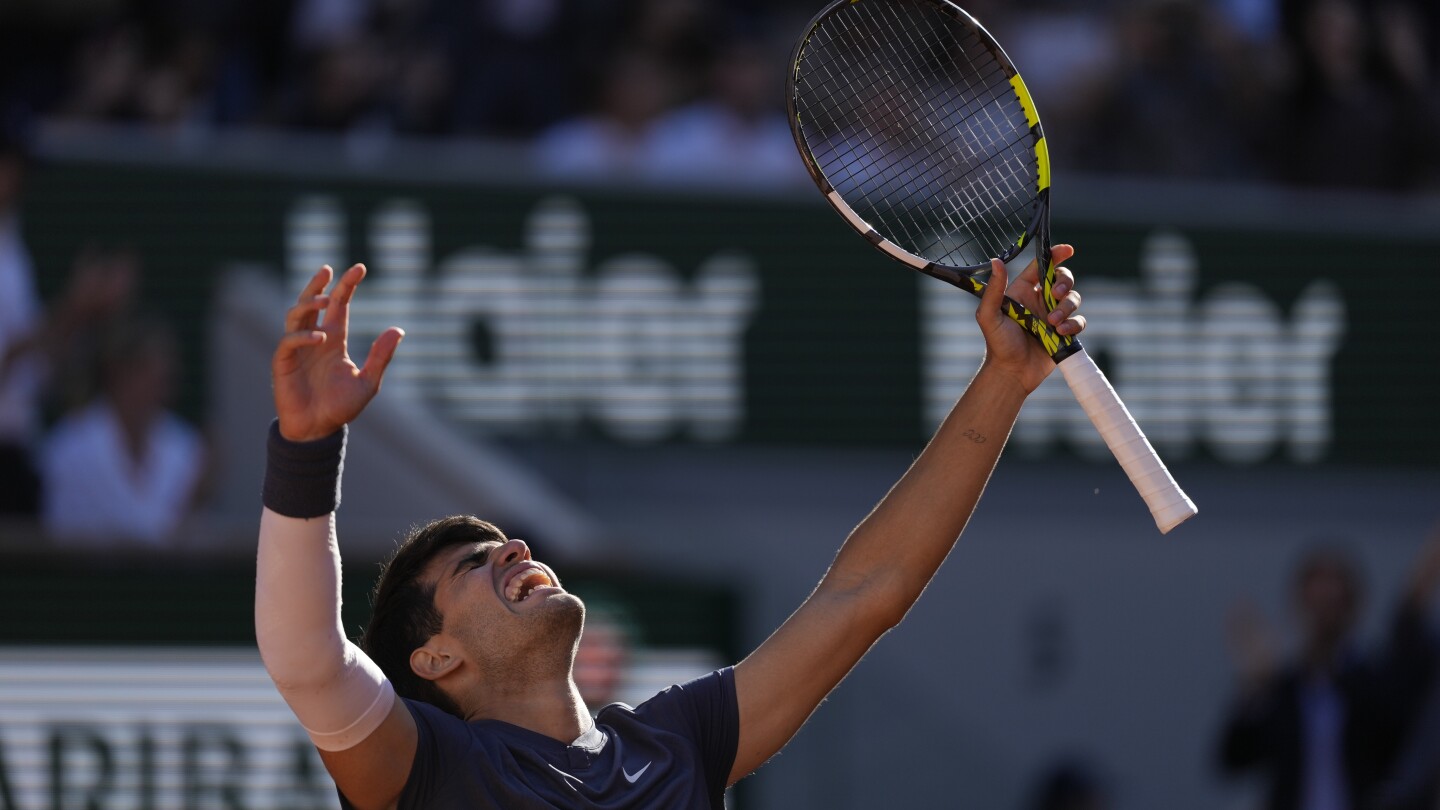PARIS (AP) — Carlos Alcaraz reached his first French Open final by beating Jannik Sinner 2-6, 6-3, 3-6, 6-4, 6-3 on Friday, making the 21-year-old from Spain the youngest man to reach a Grand Slam title match on three surfaces.
Alcaraz won the U.S. Open in 2022 on hard courts, Wimbledon in 2023 on grass and now will play for the championship on the red clay at Roland Garros after coming back to eliminate Sinner in a grueling match that stretched across 4 hours, 9 minutes.
“It’s one of the toughest matches that I’ve played, for sure,” said Alcaraz, who actually won two fewer points than Sinner, 147-145. “The toughest matches that I played in my short career have been against Jannik.”
The No. 3-seeded Alcaraz will face Alexander Zverev or Casper Ruud in Sunday’s final. It is the first men’s title match at the French Open since 2004 without any of Rafael Nadal, Novak Djokovic or Roger Federer.
Djokovic was the defending champion in Paris, but withdrew before the quarterfinals after tearing the meniscus in his right knee and had surgery this week. Because he failed to get back to the final, he will drop from atop the ATP rankings, allowing Sinner to rise a spot from No. 2, despite his defeat on Friday.
Sinner entered the semifinals with a 13-0 record in Grand Slam play in 2024 after winning the Australian Open in January. But the 22-year-old Italian also showed up in Paris with a lingering hip injury that forced him to sit out the clay-court tournament in Rome last month.
No. 4 Zverev of Germany and No. 7 Ruud of Norway were scheduled to meet in the second semifinal Friday. Zverev’s domestic abuse case in Berlin ended earlier in the day, when he reached an out-of-court settlement with his accuser, a former girlfriend.
Alcaraz vs. Sinner began in the afternoon under a blue sky, with nary a cloud in sight and the court swathed in sunlight.
They are seen as the future of men’s tennis. The present isn’t too shabby, either. Even though this was not necessarily the most aesthetically pleasing of their nine head-to-head meetings — Alcaraz now leads 5-4 — and they combined for 102 unforced errors, there were moments of brilliance that generated dueling clap-accompanied chants of each man’s first name from the Court Philippe Chatrier crowd.
Both men were troubled physically in the third set, but it was Sinner who took it. Alcaraz flexed his right hand as it began to cramp; Sinner got his right forearm and left leg massaged. It brought to mind last year’s French Open semifinals, when Alcaraz got off to a terrific start against Djokovic but then was hit in the third set by full-body cramps that rendered the remainder of the match anticlimactic.
“I learned from last year’s match against Djokovic, when I was in the same position as today,” Alcaraz said. “I know that, in this moment, you have to be calm, you have to keep going, because the cramp is going to go away. You have to stay there, fighting.”
Indeed, he never wavered, often using drop shots — sometimes to win points outright, sometimes to set up curling lobs, sometimes to pave the way for slick passing shots or his booming forehand.
In the fifth set, with shadows covering more than half the court, Alcaraz moved out front by sliding until he could reach across his body to snap a backhand passing winner for a break point. A forehand winner — one of his 30 in the match — made it 2-0 at the 3½-hour mark, earning a yell of “Vamos!” from his coach, 2003 French Open champion Juan Carlos Ferrero.
Soon, it was 3-0, and Alcaraz was on his way.
Both players walloped the ball with such force that the ball-off-strings thuds elicited gasps from spectators in the middle of points.
Sinner, his rust-colored shirt a few shades darker than the clay, came out ready at the start of the match, barely ever missing, gliding more than grinding along the baseline, stretching his long limbs to get to nearly everything Alcaraz offered. Alcaraz, his right arm covered by a white sleeve, would deliver a powerful shot to a corner, punctuated with a grunt, and Sinner would somehow get to it, flip it back and draw a mistake.
Sinner led 4-0 and it took Alcaraz 20 minutes of striving to simply place a “1” beside his name on the scoreboard.
The key statistic in that set: On points that lasted four strokes or fewer, each player took 13. But of those that lasted any longer, Sinner held a 19-8 advantage. Alcaraz would start trying to shorten the points as the match wore on.
The second set began inauspiciously for Alcaraz, who fell behind 2-0. But he did not go quietly. He turned things around right when he needed to, using a five-game run to take control of that set.
And then, after Sinner led two sets to one, Alcaraz pushed the proceedings to a fifth, closing the fourth with a cross-court backhand winner, then raising his right fist and shaking it.
With his strokes, somehow, gaining zest, and the crowd, somehow, getting louder, Alcaraz never let his early edge in the final set wane.
“You have to find the joy (while) suffering. That’s the key. Even more on clay, here at Roland Garros. Long rallies. Four-hour matches. Five sets,” Alcaraz said. “You have to fight. You have to suffer. But as I told my team many, many times, you have to enjoy suffering.”
___
AP tennis: https://apnews.com/hub/tennis

